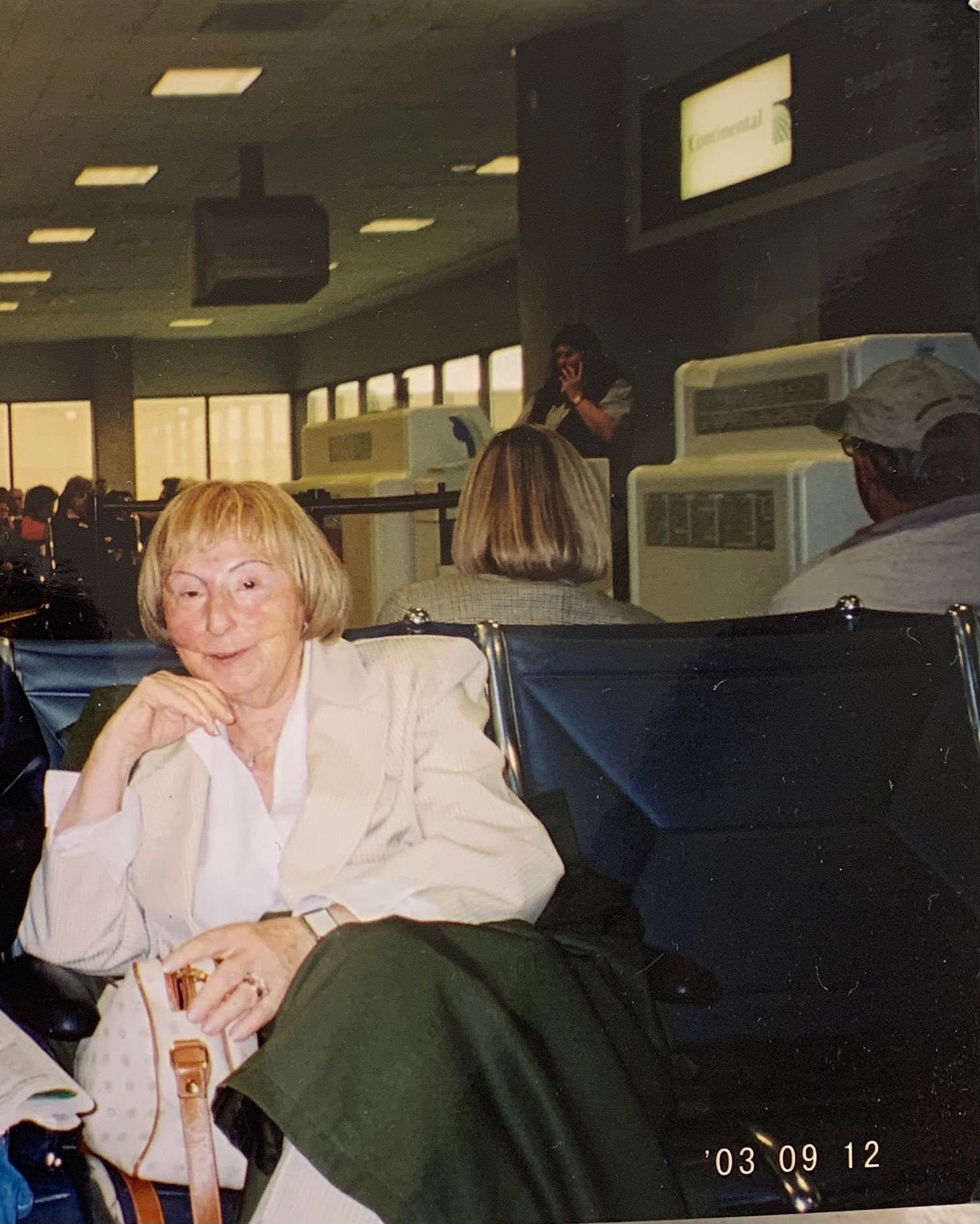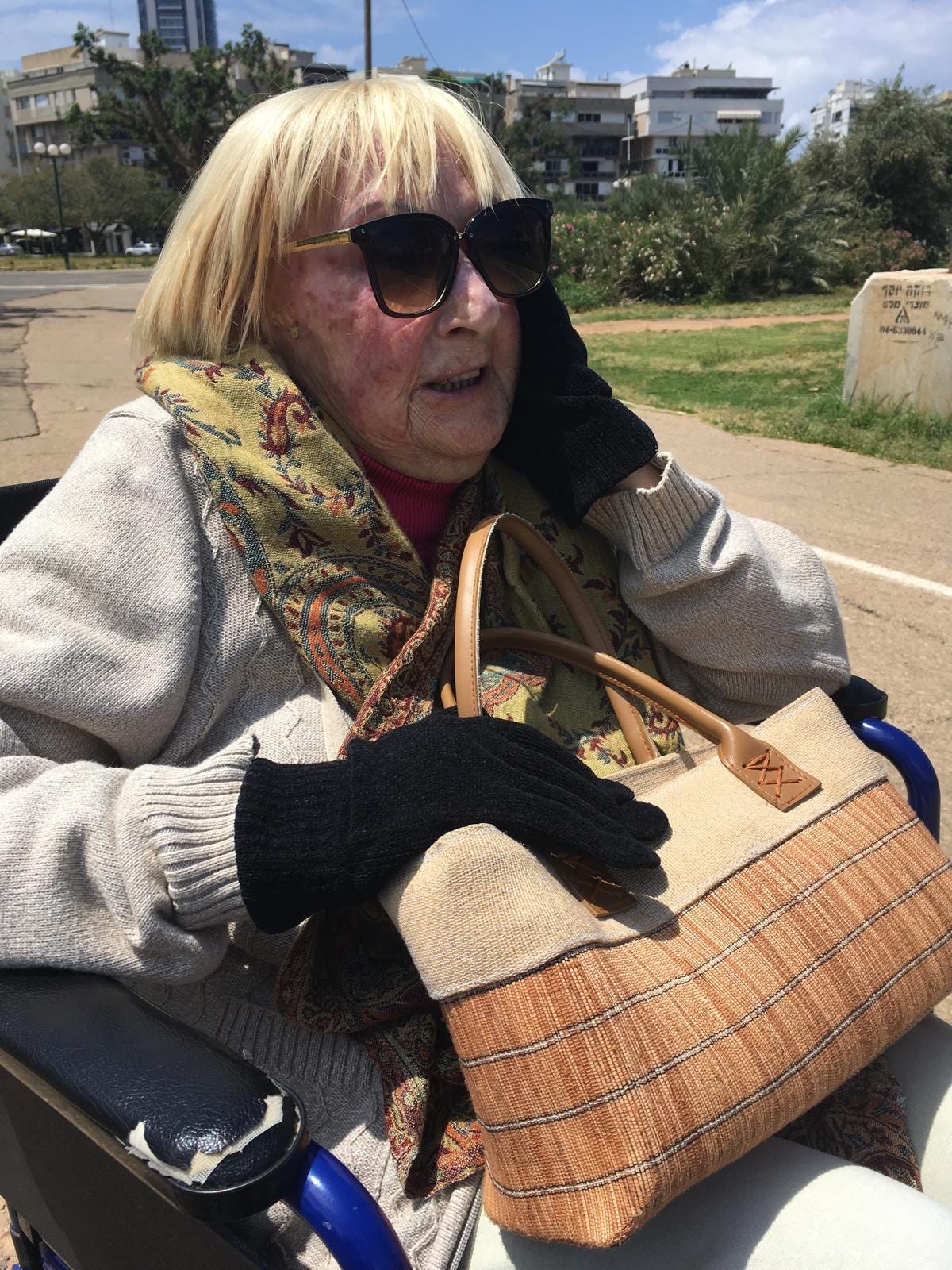Hot Slop
Fond remembrances of mediocre cooking
No one would have accused my grandmother of being too good a cook. Her culinary legacy invokes not the memory of buttery cookies, but rather raw onions and gelatinous schmaltz. Cooking was not her passion, but a duty she showed up for every day.
In Hebrew, you call your grandmother Savta. That was her name to me, though, apparently, she had a few others, which got scrambled through and beyond the second World War. She had one in her native Poland, where she survived the Lodz Ghetto, the massacre of her family and the erasure of her culture during the Holocaust. She and my grandfather would later cross the Alps to secure boat passage to the free land for Jews, only to be turned away by the British and interned in a camp in Cyprus. Finally, they’d start over in Tel Aviv, where, sixty years later, I, her entitled American grandson, would come to snatch shoko be sakit—chocolate milk in a bag—from her refrigerator.
It’s possible that my grandmother had fond memories of her childhood kitchen, of beloved family recipes passed down from her mother, but those were snatched away, along with her childhood and education. She would be a young woman marked by the experience of acute and indefinite starvation. Suffice it to say, she was an ambivalent cook, but nonetheless a devoted one. No matter what everyone had gone through in the war, no matter what they’d lost and where they’d landed, they could count on the archetypes of man and wife, mother and father, as pillars to cleave to. She kept a kitchen and kept her descendants fed.
Certain constants awaited me upon landing for a visit in Tel Aviv: clean, salty sea air; a cabdriver who felt obliged to share his regressive political beliefs; the rickety ride up an atomic age elevator; and my grandmother, standing at the door of her sweltering apartment, in a fresh blond wig and pressed skirt. And, of course, a perfectly set table.
This is a given for families who come out of war or crisis, but food is never, ever thrown out. Which is to say: if you don’t finish your tuna “salad” today, you’ll be eating it again tomorrow, and the next day, and the next day, because to waste food, after years of having none, is not an option. Down the hatch, then.
Grueling, to sit and stuff down gruel, sure. But in some domains, her cooking couldn’t be topped. Egg salad, in amateur hands, can be overdressed, drowning in too much mayonnaise. Hers was dry and elegant, with enough dill to evoke a motherland I’d never know. And then there was the soup, a scalding gauntlet through which one proved their authentic Polishness. Only a reptile could drink it down like she could, her tongue undaunted by the infernal heat. It was thick, well-blended and covered in soup nuts, to be enjoyed through winter and summer. She leant me Jane Austen novels and told me stories; she scratched my back and taught me Hebew and Yiddish. But soup was the most direct means of transmitting love.
My image of Jewish life before the Holocaust was a dull painting of carts and donkeys, but apparently my grandmother came from Polish aristocracy. This means that her standards for dining were high. She once expressed her disappointment in my cousin Keren for serving tea without a saucer and cozy. Savage. For her, dining was an art: to cross one’s legs, to trade barbs and recall witticisms from the old days, to talk shit about girls you went to elementary school with in the 1930s. It’s holding court. It demands proper form. I think I made for a good conversation partner.
Safta and I had a few favorite haunts for a dinner on the town, namely Olga and Batya, Polish restaurants no longer extant in this current age of bourgeois tapas blandness. Olga was staffed almost entirely by the owner’s daughters—some ugly, some comely—like the five girls from Fiddler on the Roof. We would tear it up, eating stuffed cabbage, kasha varnishkes and meaty goulash. I have no connection to Poland, no feeling of a homeland lost. They showed our family the door, and we never looked back. But sitting down for tzimmes with my grandmother, I could share with her in what it is to be a Jew: we move around, we adapt, and these are the dishes we pick up through the eons.
When it came to eating out, or eating anywhere outside her own kitchen, my grandmother had a predictable act. Tiny as a little elf, she’d come off as frail, and when it came time to order, she’d wave her hand wiltingly, as if she were too weak to even lift her fork. We’d order her a hamburger. And then, she’d proceed to lick the plate clean. One by one, we’d each burn through our meals, while my grandmother would slowly attack hers with precision, devouring mass quantities like a silent predator. My stepmother took it upon herself to fatten Safta up, heaping food onto her plate, knowing that she couldn’t refuse a morsel.
“Did you eat something today?” That’s how most phone calls start with my dad. Food is a status, a baseline, an essential. It’s how we, in our family, understand the quality of lived experience. My grandfather was said to be an ever-gracious eater, considering every meal to be the best he’d ever had. He was just happy to be eating, period. My dad shares that delight, and was sure to only marry good cooks, to ensure the sensation was genuine.
But every serving is heaped on with history, with a broken heritage and undigested grief. I can’t imagine what it was like for my dad and his brother growing up in the ’50s: new country, no grandparents, and a mother who just came out of a genocide, buttering the bread and playing housewife. There must have been questions too frightening to ask. These were stuffed down with food, not all of it so palatable.
I can often be as ambivalent of an eater as my grandmother was a cook. It’s not such a clear and celebratory channel, but static for dissociation. For years, my own raging anxiety would register in pangs of hunger—in the middle of sleep or even sex—a feeling like I’d not eaten in weeks, and needed to quell this panic now. I never learned how to deal, growing up, just to keep eating. Only in my thirties have I begun to stop and taste the food, to sit with my thoughts. Or so I so say here.
Regardless of its quality, it’s happening every day, many times a day. We are eating. Whether every bis is to be savored or trudged through in agony, the meal will be honored and dished out dutifully. History is cruel, the past a loaded inheritance. All one can do is fit on their best wig and lay out the fancy tablecloth. The next generation are coming up the elevator.


